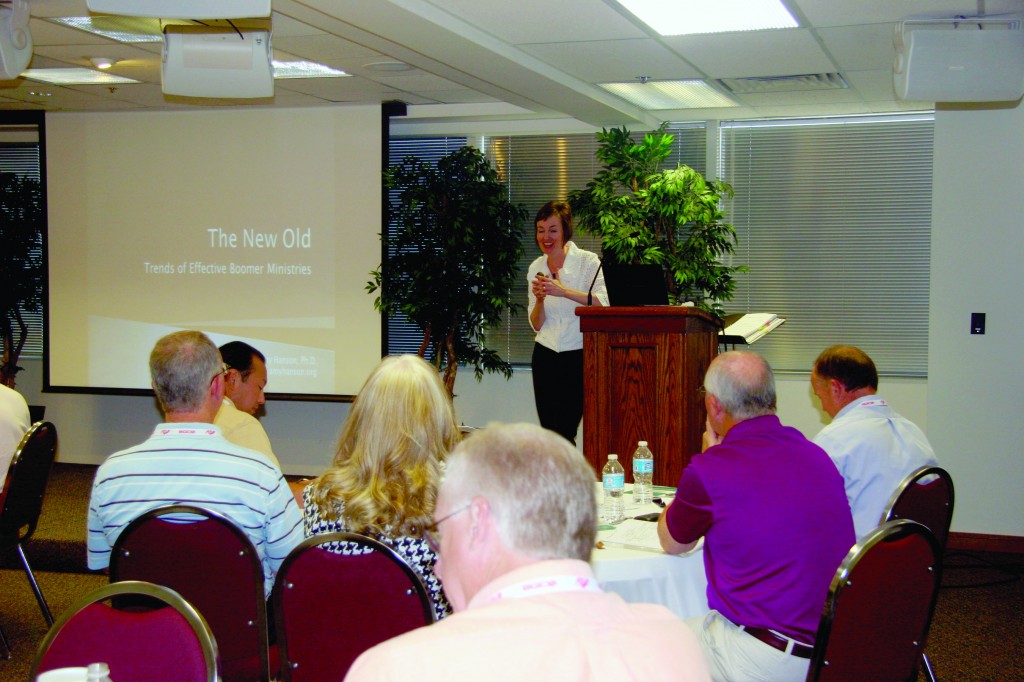Life expectancy is now 78 years, and is constantly rising. So, for decades, churches have been dealing with how to minister to the older adult. But now, there is a “new old,” and churches need to look at a changing older adult ministry.
Those adults born before 1946, and known as Builders, were shaped by two world wars and a Great Depression. They are characterized as frugal, savers, hard workers, patriotic, private, cautious, respectful, loyal and dependable. Many worked for the same company their entire careers, and they are loyal to their church and denomination.

Amy Hanson talks to participants about ministering to the Baby Boomer generation. About 120 people attended the conferences in Tulsa and Oklahoma City Sept. 11-12.
But rising as the generation born after World War II, between 1946 and 1964, are the Baby Boomers, who were shaped by Vietnam, assassinations, Watergate, the sexual revolution, prosperity, Woodstock and drugs. They are educated, media-oriented, independent, cause-oriented activists, fitness conscious, rock music fans and they question authority.
As these Boomers come into a new season of life, ministry to them has to be adjusted.
“Baby Boomers are on the cutting edge of ministry today,” said Amy Hanson, author of Baby Boomers and Beyond: Tapping the Ministry Talents and Passions of Adults Over 50, who spoke at conferences in Tulsa and Oklahoma City Sept. 11-12 on ministering to this group entering into their senior years. “It’s no accident that we have this army of people approaching this new period of their lives.”
Churches can’t have a senior potluck and expect the Baby Boomers to join in, Hanson said.
“This group has more experience and is more traveled, and what senior adult ministries have historically been built on won’t work for them,” Hanson said.
She said this age group is approaching aging in a totally different way.
“They are concerned about retiring, health, aging parents, raising grandchildren and marriage challenges,” she said. “You can’t expect this generation to jump into traditional senior adult ministries. They don’t like the word ‘senior.’ They are very attentive to their health, they are technologically savvy, they approach retirement in a different way and they need their own designated ministry.”
To engage Boomers, Hanson said churches need to respond to diversity, create ministries that help people age well and offer ministry with a purpose.
“Effective ministry emphasizes service,” she said. “They want to be engaged in something meaningful. They have discretionary time, not free time. Older adults have time and experience, which gives them ability for significant Kingdom impact. Older adults can lead significant ministries—not just folding bulletins or making coffee.”
She noted that one thing senior adult ministries do not do often is emphasize evangelism and spiritual growth.
“Just because people have reached a certain age doesn’t mean they are saved or walking with the Lord,” she divulged. “Adults don’t necessarily become more religious as they age.”
Hanson acknowledged that an effective Boomer ministry will enlist Boomers in discussion and planning of ministry.
She also said to emphasize small gatherings of Boomers, but plan some large events, too.
“Create ministry that responds to their needs and life issues, such as aging parents, adult children wandering from the faith, grandparenting, retirement and role changes,” she suggested. “Engage them in service. Rethink service opportunities. Combine serving with learning. Traveling with a purpose resonates with Boomers.”
Hanson listed practical ways for churches to become intergenerational.
“God’s Word speaks on connecting the generations,” she said. “Several things, including preconceived ideas, communication, flexibility and insecurity keep us from connecting. We are an age-segregated society.”
But, there are benefits of being an intergenerational church, she said.
“It breaks down stereotypes and demonstrates we are all valuable and important to God. It’s a logical way for faith to be shared, and it creates unity within the church,” she emphasized.
She observed there are natural ways for generations to serve side by side.
“Start affinity groups, such as ladies’ book clubs, motorcycle groups, studies on topics, something that is not age-driven,” she suggested. “Plan a few intergenerational events, such as a miniature golf tournament, pairing an older adult with a youth, and look for ways to encourage those relationships to continue after the event.”
Another suggestion was a “back to the future” event with older adults bringing memorabilia from their school days to share with youth, telling what school was like for them and then listening to what problems youth are facing in school today.
“Also educate the church body on each generation,” she said. “Make worship services intergenerational by using all ages in worship.
“Look for ways to form prayer partnerships and mentoring groups. And always remember, our goal as leaders is to help people finish well.”





